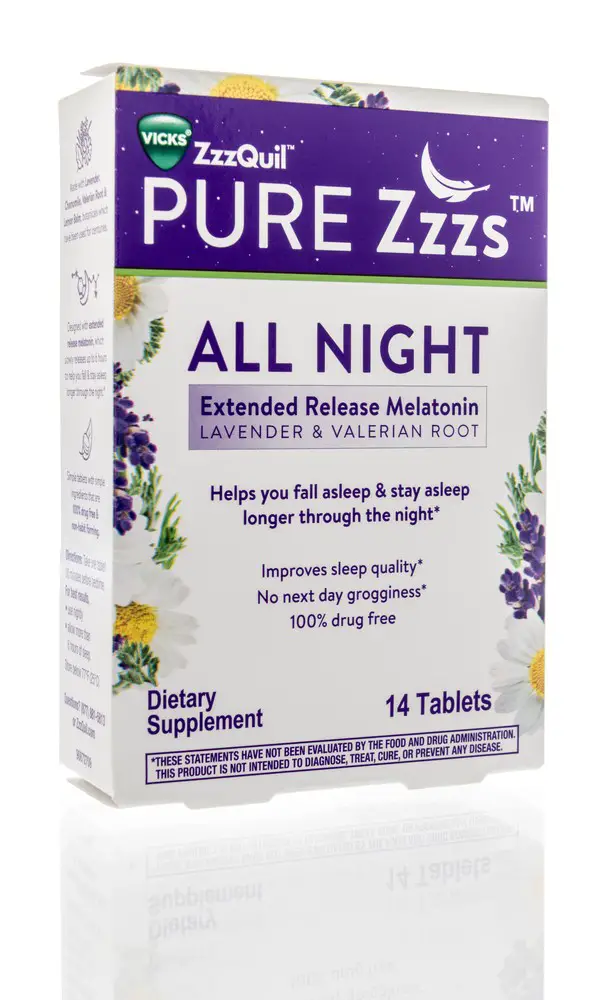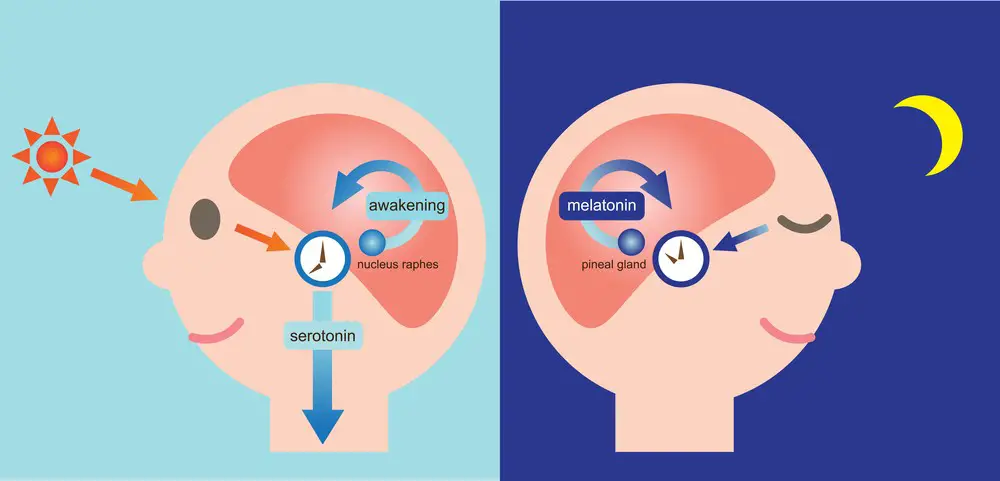As a BetterHelp affiliate, we receive compensation from BetterHelp if you purchase products or services through the links provided
When it comes to improving your mental health, there are many options available. But two of the most popular natural remedies for insomnia and anxiety symptoms are valerian root and. melatonin. Valerian root has been used since ancient times as a remedy for sleep issues, while melatonin is a more recently discovered hormone that helps regulate our sleep cycles. Both have unique benefits and drawbacks when it comes to helping us get a good night’s rest or managing stress levels, so let’s take a closer look at how they compare.
Table of Contents:
- What is Valerian Root?
- What is Melatonin?
- Benefits of Valerian Root
- Benefits of Melatonin
- Side Effects of Valerian Root
- Side Effects of Melatonin
- Which One Should You Choose?
- FAQs in Relation to Valerian Root vs. Melatonin
- Conclusion
What is Valerian Root?
Valerian root is an herb that has been used for centuries to treat insomnia, anxiety, and other sleep-related issues. It contains several active compounds believed to help promote relaxation and reduce stress. Valerian root can take many forms, including capsules, tinctures, teas, or extracts.
The valerian root’s primary active compound is valerenic acid, which acts as a sedative on the central nervous system. This helps to relax muscles and improve sleep quality by reducing restlessness and allowing the body to enter deep REM sleep more easily. Other compounds such as linarin, hesperidin, and acteoside also contribute to its calming effects on the mind and body.
Valerian root has been extensively studied for its potential benefits in treating mental health issues such as depression, anxiety disorders, PTSD (post-traumatic stress disorder), and OCD (obsessive-compulsive disorder), as well as physical conditions like headaches or muscle tension caused by stress or overwork. Studies have shown that taking valerian root may help reduce symptoms of these conditions significantly, with few side effects reported compared to prescription medications typically prescribed for these ailments.
In addition to helping people suffering from mental health issues find relief from their symptoms naturally without having to resort to pharmaceuticals drugs with potentially dangerous side effects, studies have also indicated that regular use of valerian root can improve overall cognitive performance due to its ability to boost focus while decreasing fatigue levels throughout the day making it beneficial for those who need extra energy during work hours or studying sessions alike.
It is essential, however, not to take too much at once since this could lead to drowsiness instead of providing any real benefit. It is best to start slow with small doses until you get accustomed to how your body reacts before increasing the dosage, if necessary, depending on individual needs and preferences.
Valerian root has been a natural remedy for centuries to help with sleep, anxiety, and other mental health issues. Now, let’s look at melatonin and how it differs from valerian root.
What is Melatonin?
Melatonin is a hormone naturally produced by the body that helps regulate the sleep-wake cycle. It is secreted in response to darkness, and its levels remain elevated throughout the night until morning, when it drops off again. The amount of melatonin released can vary from person to person but typically peaks between 9 pm and 3 am.
Taking melatonin as a supplement has become increasingly popular for those who struggle with insomnia or other sleep issues. Studies have shown that taking melatonin before bedtime can help people fall asleep faster and stay asleep longer than they would without it. It may also benefit those suffering from jet lag or shift work disorder due to its ability to reset the body’s internal clock.
The most common form of supplemental melatonin comes in pill form, although liquid versions are also available for those who prefer them. Dosage recommendations vary depending on individual needs but generally range from 1 mg to 10 mg daily, taken 30 minutes before bedtime on an empty stomach (with no food). Best to take the lowest dosage possible. Higher doses should only be used under medical supervision as side effects such as headaches, dizziness, nausea, and daytime drowsiness have been reported with higher dosages over long periods.
“It’s important to note that it’s really easy to overcome the effect of melatonin,” says Dr. Goldman. “If you take it and then get on your phone, go on social media, play video games or if you have an overactive mind that’s racing or worrying, you will likely overpower the effect of melatonin.”
It’s important to note that while melatonin supplements are considered safe for short-term use (up to three months), their effectiveness may decrease over time. Hence, it’s best not to take them continuously unless instructed by your doctor or healthcare provider first. Additionally, pregnant women should avoid using any supplementation without consulting their doctor first since there isn’t enough research yet about how safe these products are during pregnancy or breastfeeding.
Overall, taking a low dose of supplemental melatonin can be helpful if you’re having trouble falling asleep at night due to stress or jet lag; however, it shouldn’t replace good sleep hygiene habits like avoiding caffeine late in the day and establishing regular sleeping patterns whenever possible.
Melatonin is a hormone naturally produced in the body that helps regulate our sleep-wake cycle, and it can be taken as a supplement to help with insomnia. Valerian root has been used for centuries as an herbal remedy for sleep issues, so let’s look at its potential benefits next.
Benefits of Valerian Root
Valerian root is a popular herbal remedy used for centuries to treat various ailments. It’s known for its calming and sedative effects, making it an effective natural treatment for anxiety, insomnia, and other sleep-related issues. In addition to these benefits, recent studies have also shown that valerian root may be beneficial in treating depression, reducing inflammation, and aiding digestive problems such as irritable bowel syndrome (IBS).
Sleep Quality:
Valerian root is most commonly used to improve sleep quality. Studies have found that taking valerian root can help people fall asleep faster and stay asleep longer. This makes it an ideal natural remedy for insomnia or other sleeping disorders. Additionally, the herb has been found to reduce nighttime awakenings and increase overall sleep satisfaction when taken regularly over time.
Anxiety & Depression:
Valerian root has also been studied extensively for its potential anti-anxiety effects due to its ability to act on the brain’s GABA receptors which are responsible for regulating feelings of calmness and relaxation in the body. Several studies have found that taking valerian extract can significantly reduce anxiety symptoms compared to placebo treatments in short-term trials lasting up to four weeks and long-term trials lasting up to six months or more. Additionally, some research suggests that regular use of valerian may even help reduce symptoms of mild depression over time.
Inflammation & Digestive Issues:
In addition to helping with mental health concerns like anxiety and depression, some evidence suggests that valerian may also possess anti-inflammatory properties, potentially making it helpful in treating certain types of chronic pain conditions such as arthritis or fibromyalgia. Furthermore, preliminary evidence indicates that taking regular doses of this herb might help relieve digestive issues like IBS by decreasing abdominal discomfort associated with this condition.
While further research is needed into all areas where valerian might prove beneficial, current findings suggest this herb could relieve various physical and mental health issues, including insomnia, anxiety/depression symptoms, inflammation, and digestive problems like IBS. Suppose you think you may benefit from using this supplement. In that case, it is essential to speak with your doctor before starting any new treatment regimen so they can ensure it is safe for you, specifically based on your personal medical history.
Valerian root is a natural, safe remedy that can help reduce anxiety and promote relaxation. It’s essential to consider valerian root’s and melatonin’s benefits when looking for an effective solution to mental health issues. Let’s take a look at what melatonin has to offer next.
Benefits of Melatonin
It is often used as a supplement to help people fall asleep faster and stay asleep longer, making it an effective treatment for insomnia.
It can also be beneficial for those who suffer from jet lag or shift work disorder, circadian rhythm disorders caused by disruptions in the body’s natural sleep-wake cycle. Melatonin has been shown to reduce symptoms of jet lag, such as fatigue, difficulty sleeping, and daytime drowsiness. It may also improve alertness during the day after long flights or night shifts.
In addition to helping with sleep disturbances due to travel or working odd hours, melatonin can also be helpful for people with delayed sleep phase syndrome (DSPS). DSPS is characterized by difficulty falling asleep at night and waking up too late in the morning due to an internal clock that runs on a later schedule than most people’s regular schedules require. Taking melatonin before bedtime can help reset this internal clock so you can get better quality restful sleep.
Finally, melatonin has been studied for its potential benefits in treating certain mental health conditions such as depression and anxiety. While more research needs to be done on this topic, preliminary studies suggest that taking low melatonin may help reduce symptoms of depression when taken along with traditional antidepressant medications like SSRIs (selective serotonin reuptake inhibitors). Similarly, some studies have found that taking low doses of melatonin may reduce feelings of anxiety associated with social situations like public speaking or job interviews.
Overall, there are many potential benefits associated with taking melatonin supplements if you struggle with insomnia or other disrupted sleep patterns due to travel or shift work disorder. However, it should not replace good lifestyle habits such as avoiding caffeine close to bedtime and establishing regular bedtimes each night whenever possible.
Melatonin has many beneficial properties, including helping to regulate sleep patterns and reduce stress. However, it is essential to be aware of the potential side effects of Valerian Root before using it as an alternative therapy.
Side Effects of Valerian Root
It has been used for centuries in traditional medicine, but its effects on the body are still being studied.
One of valerian root’s most common side effects is drowsiness or dizziness. This can be dangerous if you plan to drive or operate heavy machinery after taking it, so it’s essential to be aware of this potential effect before using valerian root supplements.
Headaches are another possible side effect of taking valerian root supplements. Experience headaches after taking these supplements. It may be best to stop using them and talk with your doctor about other options for treating your insomnia or anxiety symptoms.
Stomach upset is also a potential side effect when taking valerian root supplements. Some people may experience nausea, vomiting, diarrhea, or stomach cramps after consuming these products. If you have any digestive issues while taking these supplements, contact your healthcare provider immediately, as they could indicate an underlying health issue that needs medical attention.
It is important to note that not everyone will experience all of these side effects when taking valerian root supplements – some people might not notice any at all. However, suppose you do experience any adverse reactions while using this product. In that case, you must speak with your doctor immediately, as they can help determine whether continuing use is safe for you.
Valerian root is generally considered safe. However, it can have side effects, such as headaches and upset stomach. While these may be mild for most people, it’s essential to understand the potential risks before taking this supplement. Now let’s look at the possible side effects of melatonin.
Side Effects of Melatonin
It’s often taken as a supplement to help with insomnia, jet lag, and other sleep issues. While melatonin can benefit many people, it also has some potential side effects that should be considered before taking it.
Headaches are one of the most common side effects associated with melatonin use. This can range from mild headaches to more severe migraines depending on how much melatonin you take and your sensitivity level. Taking smaller doses or starting slowly may help reduce this risk if you experience headaches when taking melatonin supplements.
Nausea is another possible side effect of taking too much melatonin or taking it on an empty stomach. If you experience nausea after taking a dose of melatonin, try reducing the amount you take or eating something before taking your supplement to see if that helps alleviate any symptoms.
Dizziness is another potential side effect of using too much melatonin at once or not spacing out doses throughout the day properly. If you feel dizzy after taking a dose of melatonin, try cutting back on how much you take and make sure to space out doses evenly throughout the day instead of all at once for best results without experiencing any dizziness or lightheadedness afterward.
Irritability is also possible when using large amounts of supplemental melatonin over long periods; however, this usually only occurs in extreme cases where someone has been using very high dosages for extended periods without consulting their doctor about proper usage guidelines and safety precautions beforehand.
Finally, it’s important to note that melatonin may interact with certain medications, such as blood thinners or antidepressants. Therefore, it is always best practice to talk to your doctor before beginning supplementation if you are currently on any medications to avoid any potential adverse reactions between them and melatonin which could potentially cause serious health risks.
Although melatonin is generally safe to take, it can cause side effects in some people. Knowing each supplement’s potential risks and benefits can help you decide which is best for your needs.
Which One Should You Choose?
Valerian root and melatonin are two natural supplements used centuries to help with mental health issues. Both of these supplements can be beneficial, but it’s essential to understand their differences before deciding which one is right for you.
Valerian root is an herb native to Europe and Asia that has been used since ancient times as a sedative and sleep aid. It contains several compounds that act on the brain differently, including increasing levels of GABA (gamma-aminobutyric acid), a neurotransmitter associated with relaxation and reducing anxiety. Valerian root also increases serotonin levels, another neurotransmitter involved in mood regulation. Studies have shown that valerian root can reduce stress, improve sleep quality, and even help treat depression symptoms in some cases.
Melatonin is a hormone naturally produced by the body during dark hours to regulate our circadian rhythm or “body clock” – this helps us feel alert during the day and sleepy at night. Supplementing with melatonin can be helpful if your body isn’t producing enough of its own or if you’re having difficulty sleeping due to jet lag or shift work schedules. Melatonin has also been found to reduce anxiety levels when taken regularly over time; however, it should not be taken too close to bedtime as it may interfere with standard sleep patterns.
Ultimately, only after thoroughly researching both options will you be able to determine which is best suited for your needs. It is essential to consider what issue you are trying to address, whether it is something more immediate, such as relief from insomnia, or longer-term, like reduced stress. Potential side effects should also be considered as how comfortable you feel taking either supplement long-term.
FAQs
Which is better, valerian or melatonin?
Valerian and melatonin are both natural supplements used to help with sleep. Valerian is an herb used for centuries as a sedative, while melatonin is a hormone naturally produced in the body. Both are effective in helping people fall asleep faster and stay asleep longer. However, valerian may be more effective than melatonin for those suffering from mental health issues such as anxiety or depression due to its calming effects on the nervous system. Additionally, some studies suggest valerian may improve cognitive functioning and reduce stress levels better than melatonin. Ultimately, it’s best to consult your doctor before taking either supplement so they can recommend the most suitable one for you based on your individual needs.
Is valerian root the same as melatonin?
No, valerian root and melatonin are not the same. Valerian root has been used for centuries to help with insomnia, anxiety, and other sleep-related issues. It works by increasing levels of gamma-aminobutyric acid (GABA) in the brain, which helps to relax muscles and reduce stress. Melatonin is a hormone naturally produced by the body that helps regulate your sleep cycle. It can be taken as a supplement to help people fall asleep faster or stay asleep longer. So while valerian root and melatonin may have similar effects on improving sleep quality, they work differently in the body and should not be considered interchangeable.
What are the negative side effects of valerian root?
However, it can have some adverse side effects. Common side effects include headaches, dizziness, nausea, stomach upset, and drowsiness. In rare cases, valerian root may cause more serious adverse reactions, such as allergic reactions or liver damage. Additionally, long-term use of valerian root has been linked to an increased risk of depression and other mental health issues in some people. Therefore, you must consult your doctor before taking any supplements or medications for mental health concerns.
Is it OK to take valerian root every day?
Valerian root is a natural supplement used for centuries to help with sleep and anxiety. While it may be safe to take valerian root daily, it is essential to consult with your doctor or healthcare provider before taking any supplement, especially if you have existing mental health issues. Valerian root can interact with certain medications and could potentially worsen symptoms of depression or other mental health conditions. Before starting any new supplement regimen, discussing the risks and benefits of taking valerian root regularly with your healthcare provider is best.
Conclusion
When it comes to valerian root vs. melatonin, both have their benefits and side effects. Ultimately, the decision of which is best for you should be made in consultation with your doctor or mental health professional. They can help you decide which option is most suitable for your individual needs and provide guidance on using them safely and effectively.
- Stress Management: What is the Relationship Between Stress and Addiction? - June 28, 2024
- Exploring Techniques to Maintain a Healthy Lifestyle without Drugs - May 28, 2024
- How Acupuncture Helps Treat Chronic Fatigue Syndrome - May 28, 2024
This site contains affiliate links to products. We will receive a commission for purchases made through these links.



.jpg)




